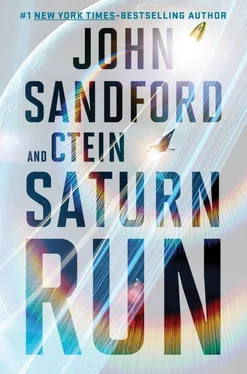“But 511 keV—”
“SHUT UP!” Crow took a breath; sleep deprivation and stim pills weren’t conducive to clear thinking. Calm down.
Sandy kept his mouth shut.
After a moment Crow said, “Sorry I yelled at you. We’ve got gamma ray satellites and detectors up the wazoo to ferret out any evidence of folks playing with Bad Things. So does every other major power. Some of those systems will see this. At first they’ll just think it’s another false alarm from some gamma ray burster out in another galaxy, but they’re going to figure out pretty fast it isn’t. Five hundred and eleven keV, that’s the signature of electron-positron annihilation, and you bet we look hard for that. We do not want anyone screwing around with measurable amounts of antimatter on Earth.”
“So, what?”
“So no change in what we’re doing. We still need to find out what the hell the little green men have been doing at Saturn, and what they rendezvoused with and what they left behind.”
“And how they’re making a whole lotta antimatter, apparently.”
“Yeah, and how they’re storing it. Hey: thanks for the call. Keep your ear to the ground out there. I gotta call Santeros and a few other people.”
Crow disconnected and thought for ten seconds, then put in an urgent call to Fang-Castro. USSS3 kept to the same time as Washington, D.C. She was unlikely to be happy to hear from him.
The moment her bleary-eyed face appeared on the screen, he said, “Sorry about the early hour, Captain, but there’s been a sudden change of plans. The starship has departed Saturn, and if the entire world doesn’t know that already, it very soon will. Accordingly, I’m upping the security level at USSS3. I need to take some immediate steps.”
While he was talking, he was thumbing instructions into his phone.
Fang-Castro was now fully alert. “I imagine so, Mr. Crow. What exactly are you planning?”
“Within the next few minutes, we’ll be locking down your computer systems and Earth links. Everyone except you will need a new password, which we’ll provide as we finish vetting your personnel. In order to keep essential station functions running, nobody currently logged in will be kicked off yet, but they will be in thirty minutes. You will have admin status and can assign new 6V passwords to personnel you deem necessary and absolutely trustworthy, to keep the station running. Please keep it to a minimum. Any passwords you assign will also have to be updated every twenty-four hours, until we get the personnel completely vetted and permanent new passwords assigned.”
“Are you expecting trouble, Mr. Crow?” She was tapping the pad by the phone. “I’m rousing our security detail, such as it is, right now.”
“I don’t know about trouble,” Crow said. “I mean that literally: I don’t know. That’s why I’m casting such a broad net. We need to isolate and remove all foreign nationals and non-citizens from the station. I have a list of those personnel… sending it to you… now. Until we can ferry them off the station, make sure that these people are always in their quarters or under the visual supervision of your security people or mine. Under no circumstances are they to be allowed access to the computer systems, not even for personal business. If they have personal or research files on the computer, I’ll see that they get forwarded to them promptly and in full once they’re groundside. Nobody in particular is under suspicion. Anyone I had doubts about was reassigned off the station weeks ago. This is purely precautionary.”
Fang-Castro gave him an appraising look. “So noted, Mr. Crow. I appreciate getting the heads-up before you shut down my station.”
Crow was not oblivious. “I hear you, Captain. The station remains under your authority. I apologize if I implied otherwise, but this is a bit of an emergency. Now I gotta talk to Santeros. I’ll be in touch again, soon as I can.”
Crow checked the time: 5:20. The President normally rose at 5:45. Good. He thumbed her private direct access number. It was a necessity of the job, rousting the high and mighty out of bed.
Nothing would ever get him to admit that he enjoyed it.
By the time Crow made his prediction that everybody would soon know about the aliens, that fact was already history. Near-Earth space was filled with an assortment of civilian radiation telescopes and a multinational network of radiation-detecting arms-control satellites.
Simultaneous with the Sky Survey Observatory seeing the starship engine’s ignition, the arms control array had picked up a faint but statistically significant increase in the 511 keV background. Near-instantaneous analysis by security computers did not point to a terrestrial origin so, following a tradition that went back the better part of a century, the data was passed on to the astronomers’ computers.
Some of those instruments were already on top of it. Their “first alert” radiation scopes talked directly to a slew of fast-response telescopes that covered everything in the electromagnetic spectrum from ultra-high-energy gamma rays to long band radio wavelengths. The new gamma ray source was identified and localized in less than a minute.
In less than five, phones started ringing in the offices and by the bedsides of any astronomers who had the faintest interest in this kind of astronomy. The telescopes were looking at something new. This source wasn’t showing anything like a normal time vs. brightness curve in any wavelengths. It was unlike a gamma ray burster or supernova or any other known astronomical object.
It took only a few more minutes for the position of the new source to be refined enough to be able to tell that it was moving and that it had obvious parallax—telescopes on different parts of the earth and in different parts of the sky were seeing it in slightly different locations relative to the background of stars.
The difference was a lot bigger than experimental error. Though the source might be extraterrestrial, that meant it was damn close by astronomical standards. It not only looked like it was close to Saturn, it was close to Saturn. It took even less time to determine that the motion was changing. The source was accelerating.
The ball finished dropping twenty minutes after first detection. By then, no fewer than five different astronomers’ working groups had back-extrapolated the trajectory, which is what they were already calling it, having stopped thinking of it as a natural object. The source had departed from a specific point in Saturn’s rings.
The International Astronomical Union had clear protocols for how to handle detection of extraterrestrial intelligence (DETI). Everyone with enough brains to call themselves an astronomer agreed that if this didn’t qualify as a plausible detection, then nothing would, until they were shaking hands with the little green men themselves.
All of that instantly became the worst-kept secret in scientific history.
In another hour, a dozen different astronomy departments at a dozen top universities had figured out that what was going up must have previously come down. The data-mining began in earnest. There was a lot to be mined; the assortment of sky survey and space watch telescopes generated zettabytes of new imagery across a wide swath of the electromagnetic spectrum every day. It was exactly like looking for a needle in a haystack.
The thing about that: once you knew you were looking for a needle, metaphorically speaking, the looking got a lot easier. You could toss out anything that was too long, or too broad, or too heavy, or that wasn’t made of metal, and so on. The astronomers had some idea of what this needle would look like. It would only be a matter of time, working their way back from the present through the archived data, before they found it.
Читать дальше








